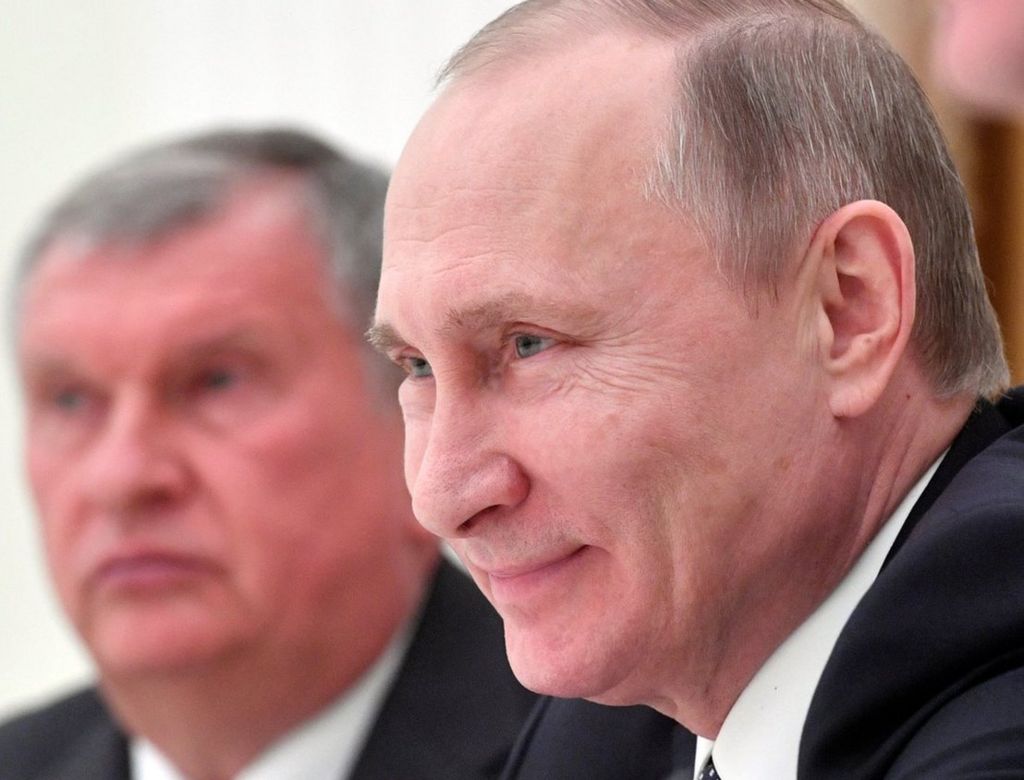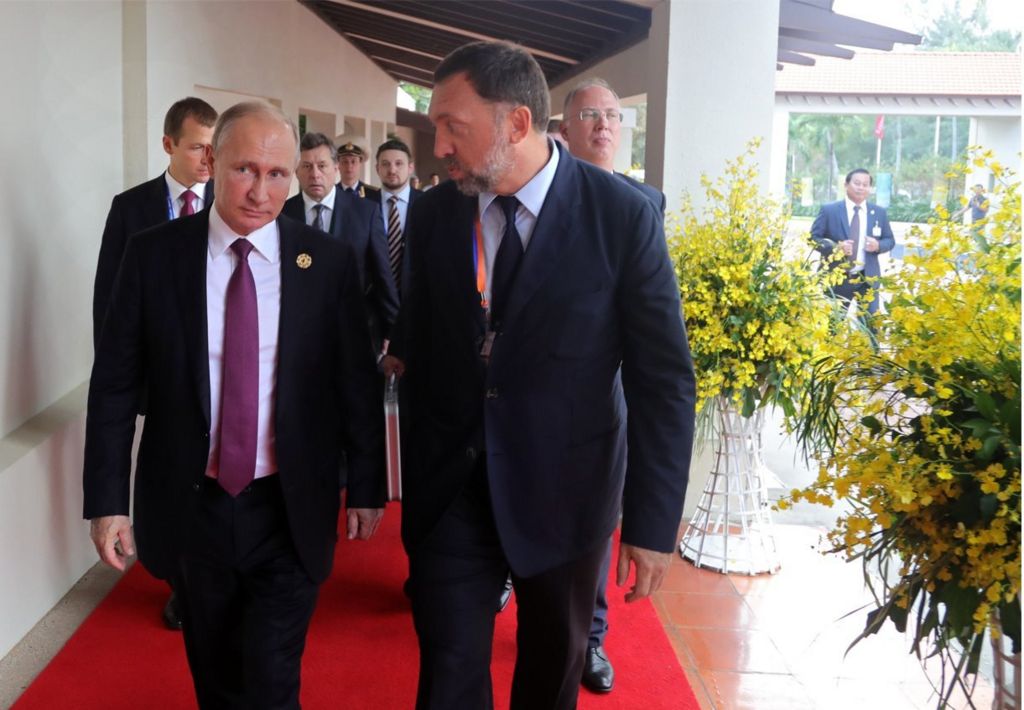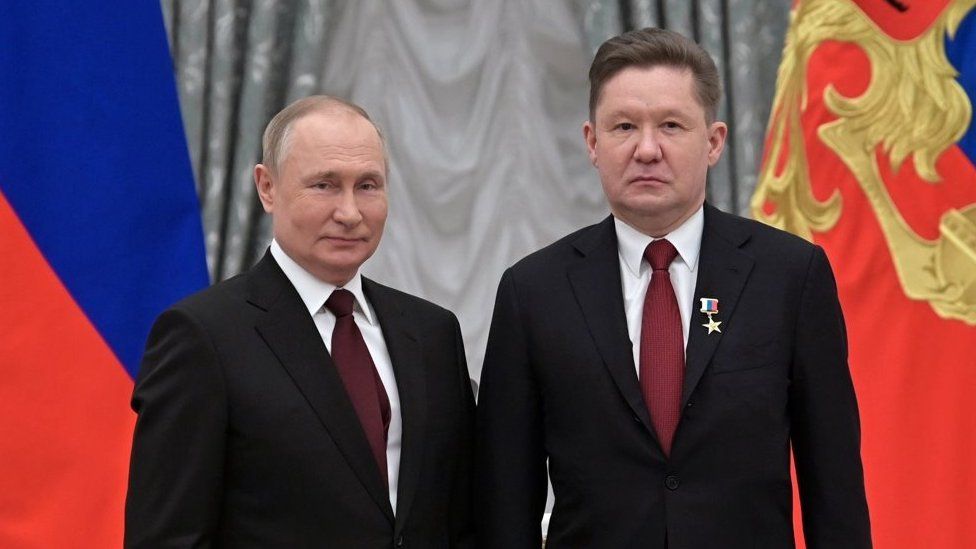BBC News 5 March 2022 - by Daniel Sandford
The UK, EU, and US governments have responded to Russia's invasion of Ukraine with devastating sanctions against the billionaire businessmen perceived to be in President Vladimir Putin's inner circle.
But while some of those closest to him took his advice and remained invested in Russia, others kept their money in palatial properties overseas and football clubs, and their companies remained listed on foreign stock exchanges.
They now find themselves scrambling to hold on to their assets amid the most comprehensive economic penalties imposed in the modern era. Here's what we know about some of them.
SANCTIONED BY: US, EU, UK
Said to be one of Mr Putin's favourite oligarchs, Alisher Usmanov is also one of the richest, worth an estimated $17.6bn, according to Forbes. A former professional fencer, the EU describes him as a "businessman-official" who helps the president solve his business problems.
Born in Uzbekistan while it was still part of the Soviet Union, he runs USM Holdings, a huge conglomerate that involves mining and telecoms, including Russia's second biggest mobile network MegaFon.
The EU announced sanctions against him on 28 February, and the US and UK have followed suit. He has called the sanctions unfair and said all the allegations against him were false.
USM Holdings appears to be hoping to avoid EU sanctions as he owns just under 50% of the shares. His superyacht Dilbar, named after his mother, is undergoing a refit in Hamburg and is now at risk of being seized.
In the UK, his main visible investments are in property. In London he owns Beechwood House, a £65m country house with grounds in the heart of the city, and just outside London in Surrey, he owns a Tudor mansion, Sutton Place. Both have been frozen by UK authorities.
His business partner Farhad Moshiri owns Everton, and Mr Usmanov's companies USM, MegaFon and Yota have been key sponsors at the club, with suggestions his involvement was even closer. Everton suspended the sponsorship deal on Wednesday, and Mr Moshiri quit as a USM board member.
SANCTIONED BY: NONE
One of the most high-profile Russian billionaires because of the phenomenal success of his football club Chelsea FC, Roman Abramovich has not yet been sanctioned, possibly because he is less obviously influential than other Putin allies.
How influential he is in the Kremlin is much debated. Some suggest he is merely tolerated by President Putin, others say the relationship is much closer than that.
Mr Abramovich strongly denies having close ties to Mr Putin or the Kremlin, but his estimated $12.4bn fortune is vulnerable if sanctions were to be imposed. On Wednesday he announced that he was looking to sell Chelsea for £3bn, and his £150m house in London's Kensington Palace Gardens in London is reportedly up for sale.
Mr Abramovich made his money in the 1990s and was one of the original oligarchs during Boris Yeltsin's presidency. His biggest break was buying the oil company Sibneft at a knockdown price. His assets include the third-longest yacht in the world, Eclipse, which on Friday was cruising off the British Virgin Isles, and another mega-yacht, Solaris, moored in Barcelona.
He has started to withdraw from the UK in recent years. In 2018 he decided not to apply to renew his UK visa, and has instead been using his newly acquired Israeli passport to visit London. And while he used to go to every Chelsea home game, he is now rarely seen at Stamford Bridge.
SANCTIONED BY: US
When President Putin came to power, Oleg Deripaksa was immensely rich, his wealth peaking at about $28bn - but he is now thought to be worth a mere $3bn.
He fought his way to a fortune in the 1990s, coming out on top in a vicious battle for the aluminium industry. The US said he was involved in money laundering, bribery, extortion and racketeering, and reported allegations that he had "ordered the murder of a businessman, and had links to a Russian organized crime group". He denies the allegations.
He suffered badly in the 2008 financial crisis and needed Mr Putin to bail him out. In 2009, President Putin humiliated him by suggesting publicly that he had stolen a pen. Since then, he seems to have worked himself back into favour and was described in the Mueller report - a US investigation into Russian efforts to interfere in the 2016 US presidential election - as being "closely aligned" with the president.
He founded a green energy and metals company, En+ Group, which is listed on the London Stock Exchange, but he reduced his stake in it to below 50% when he was subjected to US sanctions in 2018. At the time, one of Mr Deripaska's companies Basic Element released a statement calling the sanctions "groundless, ridiculous and absurd".
He owns a vast art deco property, Hamstone House in Weybridge, Surrey, which he has been trying to sell for £18m since Anglo-Russian relations got worse after the Skripal poisonings. He also owns a yacht, Clio, which was in the Maldives on Wednesday.
Unlike many sanctioned oligarchs Mr Deripaska has been vocal about his view on the war, taking to social media to call for peace. "Negotiations need to start as soon as possible!" he wrote.
SANCTIONED BY: US AND EU
Igor Sechin's connections to Vladimir Putin run long and deep, according to the EU which announced sanctions against him on 28 February. He is said to be one of Mr Putin's most trusted and closest advisors, as well as a personal friend, and the two are thought to be in daily contact.
His progress was made through ruthlessly pushing aside opponents - his nickname in the Russian press is Darth Vader. A leaked US embassy cable from 2008 described him as "so shadowy that it was joked he may not actually exist but rather was a sort of urban myth, a bogeyman, invented by the Kremlin to instil fear". The US imposed sanctions on him in 2014, which he called "totally unjustified and illegal". They announced new sanctions against him on 24 February.
Mr Sechin has spent his career alternating between jobs in politics and business, sometimes holding senior jobs in both at the same time. When Putin was prime minister, he was a deputy prime minister, and now runs the state oil giant Rosneft.
Mr Sechin worked with Mr Putin in the mayor's office in St Petersburg in the 1990s, and is widely believed to have been in the much-feared intelligence service, the KGB, although has never openly admitted it.
Based in Russia, no-one knows how much money Mr Sechin has, but the French have seized a yacht called Amore Vero that was linked to him after his second wife Olga Sechina kept posting photographs of herself on board. They have since divorced.
Beyond that there is little sign he has substantial wealth overseas that could be easily uncovered, and it may be hard to track down and freeze any more of his assets.
SANCTIONED BY: US
Alexey Miller is another old friend of Vladimir Putin's. Something of a grey man, he too has built his career on loyalty to the president, starting when he was Mr Putin's deputy on the foreign relations committee of the St Petersburg mayor's office in the 1990s.
He has run the immensely powerful state-owned gas company Gazprom since 2001, but it was a surprise appointment and it is widely assumed that he is just carrying out the orders of his old boss. The US ambassador to Moscow in 2009 described Gazprom as "inefficient, politically driven, and corrupt".
Mr Miller was not sanctioned after the annexation of Crimea in 2014, but when he was added to the list in the US in 2018, he said he was proud. "Not being included in the first list. I even had some doubts - maybe something is wrong? But I am finally included. This means we are doing everything right," he said.
He does not appear to have easily traceable assets outside Russia and there is no information about his net worth.
SANCTIONED BY: EU
The EU describes Pyotr Aven (pictured on the left) as one of President Putin's closest oligarchs, and MIkhail Fridman as an enabler of Putin's inner circle. Together the two men created Alfa-Bank, the largest private bank in Russia.
The Mueller report said Mr Aven met with Putin in the Kremlin about four times a year, saying he "understood any suggestions or critiques Putin made during these meetings were implicit directives, and there would be consequences for Aven if he did not follow through".
They were warned by Mr Putin in 2016 to protect their interests from future sanctions. This week the pair stood down from the London-headquartered LetterOne investment group they founded almost 10 years ago because their shares were frozen by EU sanctions on 28 February. Mr Aven also stood down as a trustee of the Royal Academy of Arts in London.
The two businessmen said they would "contest the spurious and unfounded basis for the imposition of these sanctions - vigorously and through all means available to them".
Mr Fridman, thought to be worth around $12bn, lives in London in a house next to Lord's Cricket Ground and also owns a huge property, Athlone House in north London, that he paid £65m for in 2016.
At a London press conference on Tuesday, he said the Ukraine war was a "huge tragedy" but would not criticise the Kremlin directly saying to do so could put the jobs of hundreds of thousands of employees at risk.









